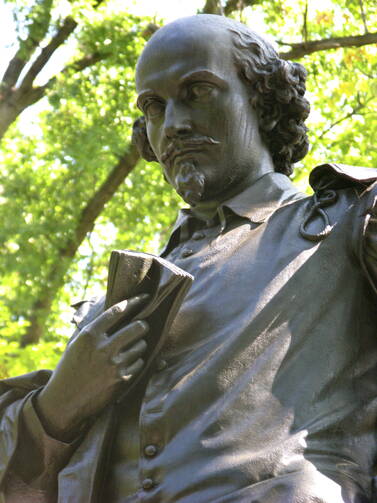I fell in love with Shakespeare 30 years ago, on a houseboat in Srinagar, India. I was on a six-week jaunt through India before returning to Oxford to finish a degree in English Literature. The only book I carried with me was the one-volume Alexander text of Shakespeare’s complete works, so that I could work on an essay for school. The essay topic, scribbled inside the front cover of my travel journal, was this: “Samuel Johnson said of Shakespeare, ‘comedy was his instinct, tragedy his skill.’ What did he mean? Was he right? How do you see the relation between classical forms in Shakespearean drama?” During those six weeks, I read my way through nearly all of the plays, and began to sketch out what became a 40-page reply to Samuel Johnson’s provocation.
Up until that time, my relationship with Shakespeare had been more like a cordial but dutiful friendship that you maintain because your mother approves of it. A play a year in high school, a survey course in college and a range of excellent Royal Shakespeare Company performances during my sojourn in England (including Alan Rickman as Jaques in “As You Like It” and Derek Jacobi as Prospero in “The Tempest”) had deepened my familiarity with the Bard without igniting any real passion. But as I bathed in the Indian sun on the rooftop of the houseboat on Nagin Lake, the thick Alexander tome propped up in front of me, I began to see patterns in theme and character emerge across Shakespeare’s oeuvre, and I gained a profound appreciation for the skill with which he explored and portrayed the mysteries of human existence.
That immersion experience profoundly changed my attitude, and since then Shakespeare and I have been in close correspondence. Upon my return to the United States, I found my way into the office of Joe Papp, theatrical impresario and founder of Public Theater’s Free Shakespeare in the Park in New York. One thing led to another, and we co-authored a book on Shakespeare. After that I worked as a directorial assistant on several Shakespeare productions proffered by Papp, most notably “A Midsummer Night’s Dream” (with Elizabeth McGovern, F. Murray Abraham and John Leguizamo) and “The Winter’s Tale” (with Mandy Patinkin, Christopher Reeve and Alfre Woodard, directed by James Lapine).
Since then, I have lectured, taught, reviewed productions and written about Shakespeare whenever the opportunity presented itself. I narrate an annual concert of Renaissance music around the time of Shakespeare’s birthday. And I go back to the plays at will, sometimes in preparation for a performance I will see, sometimes simply because a specific play seems particularly pertinent. A few weeks ago, for example, I embarked upon a re-reading of the sequence of history plays known as the “Henriad,” which covers the usurpation of the established political order by a brash newcomer and the events that flow from it. Its relevance is striking.
Each time we meet Shakespeare, we bring ourselves to the encounter: our circumstances, our attachments, our outlook. As the years have passed and my experience of life has deepened, I have found new dimensions of meaning and wisdom in those rich and allusive texts. The furtive lasciviousness of the strict Angelo in “Measure for Measure” brings to mind the hypocrisy of public officials I have seen outwardly preaching virtue and secretly practicing vice. Years of bandaging skinned knees, folding clothes and preparing favorite dishes as a mother and wife have sensitized me to the importance of small acts of kindness, like that of the unnamed servant in “King Lear” who responds to the brutal blinding of Gloucester by running to fetch some flax and egg whites to salve the wounds. Having coped with my children as toddlers (and teenagers), I have a finer appreciation for the recalcitrance of the prisoner Barnardine in “Measure for Measure”: he throws a monkey wrench into the Duke’s artful manipulation of events by refusing to die on cue. Likewise, I have observed some of my contemporaries grow from raucous adolescents into pillars of the community, and so I nod knowingly at the dissolute Prince Hal’s evolution into King Henry V.
Of all these visions and revisions, however, perhaps the most powerful was a return engagement with “The Winter’s Tale.” When I worked on the play in the late 1980s, I was in my 20s, unmarried and childless. I came to know this late Shakespearean romance intimately, and while I found the reconciliation scene at the end lovely, I do not recall being especially moved by the play.
Fast forward to 2011 to a Royal Shakespeare Company performance of “The Winter’s Tale” in New York City. By then I had been married for two decades. As Leontes’ irrational jealousy exploded into a public shaming of his pregnant wife, Hermione, I found it almost unbearable to watch. The intervening years had given me a more profound understanding of the emotional register of a marriage, and I was deeply affected by the sight of one unspooling violently before my eyes. Shakespeare’s text had been transmitting the powerful signals all along; earlier in my life I simply lacked the receptors for them.
The purpose of drama, as Hamlet famously instructs the Players, “was and is to hold, as ’twere, the mirror up to nature.” Shakespeare’s plays, on the page or on the stage, serve as just such a mirror for our human nature, reflecting back what we ourselves bring to them. Putting aside scholarly disputes about quartos and folios, fair copies and foul, his words don’t change much from year to year. But we change, as we gain experience and hard-won understanding, and no matter which play we turn to, we can’t help noticing something different than before. Shakespeare offers his endlessly replenishing and varying dramatic bounty to people of all ages, in all times. I look forward to growing old with him.








